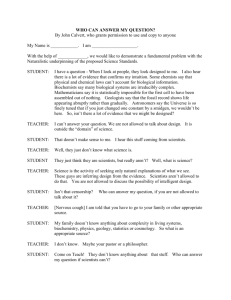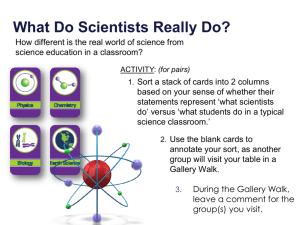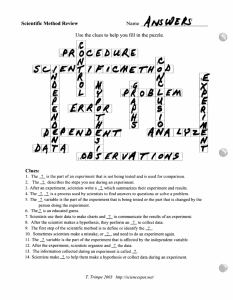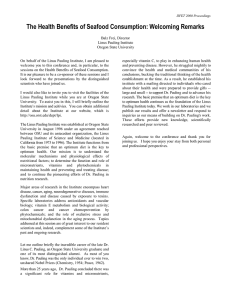The Scientist and Society
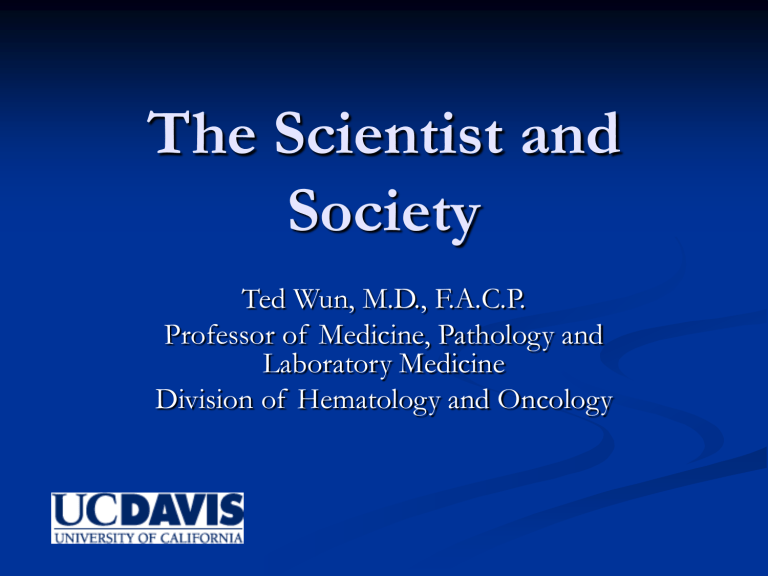
The Scientist and
Society
Ted Wun, M.D., F.A.C.P.
Professor of Medicine, Pathology and
Laboratory Medicine
Division of Hematology and Oncology
Why this topic?
This was a topic considered by many to be important in RCR but was left out of the final
NIH recommendations
Tony Perez took my topic
An interesting personal conversation
Chemistry
(1954)
Peace
(1962)
Linus Pauling (1901-1994)
Founding Father of molecular biology
Probably the most visible and accessible of American scientists
Over 1,000 articles and books, 2/3 scientific
Wrote many books for the public; notorious Vitamin C
The Nature of the Chemical Bond is considered the most influential scientific book of the 20 th century
Described sickle cell disease as a molecular abnormality of hemoglobin along with Harvey Itano
Linus Pauling: Social Activist
The day he had dinner with JFK in honor of Noble Prize winners, he picketed the White House to ban atmospheric nuclear testing
“Minimization of suffering” was his guiding ethical principle
Outspoken critic of nuclear weapons and “loyalty oaths” during the McCarthy era
Asked other scientists to join him and presented a petition signed by
9,000 scientists to the U.N. in 1958; eventually signed by 11,000 (before the internet)
Nuclear test ban treaty went into effect in 1963; on that same day Pauling was awarded the Nobel Peace Prize
Lifelong critic of war
Left his post at Caltech due to pressure from administrators
"It is sometimes said that science has nothing to do with morality. This is wrong. Science is the search for truth, the effort to understand the world; it involves the rejection of bias, of dogma, of revelation, but not the rejection of morality...."
Linus Pauling
What is the purpose of science?
Natural Philosophy
The term “science” was not coined until the
1800’s
Newton’s “The Mathematical Principles of Natural
Philosophy”
Many of histories great scientists wrote on
“humanistic subjects”
Aristotle, Boyle, Bacon, Descartes, Newton, Darwin,
Einstein
“Hard” and “Soft” Science
Universities are split among the “humanities” and the “sciences”
The commonly held conception that each “side” does not understand the other
“How is an English Professor going to appropriately judge my work”
Economics, sociology, political “science” considered “pseudo-science” by many of us
Concept that the hard sciences are valueless, cold, complex, and inhumane
Science in Ancient Greece
Modern science began in Ancient Greece
Natural explanations for natural phenomenon
Socratic method
Theories
Observations and experiments
Did not have a split between science and other disciplines
The basis for what we consider a liberal education is based on
Greek intellectual life
The highest type of knowledge was the form of the good
Science and the Renaissance
There was also not as dramatic a split between science and the arts
Leonardo da Vinci
Detailed drawings of human anatomy, animals
Inventor
Mona Lisa
The Scientific Revolution
Copernicus, Galileo, Vesalius, Harvey, Newton
Challenged Church dogma and thus the authority of the
Church
Science was established as a social institution separate from Church and State
The Enlightenment
Strong “faith” in science and technology
“Belief ” in the power of human reason
Science should not concern itself with teleological explanations?
Science Grows in Influence
Science began to have broad influence on Western culture
Scientific method applied to many areas of finance, government
Scientists became respected and influential
Backlash
Luddites and Amish
Thoreau’s Walden, Shelley’s Frankenstein
Darwin
“Mad Scientists”
Scientists and Social Responsibility
Many of the scientists that worked on the Manhattan project felt guilt and moral revulsion at their role in the bomb
Robert Oppenheimer was especially haunted and opposed the development of the hydrogen bomb
Also fell victim to McCarthyism
Rachel Carson’s Silent Spring
Union of Concerned Scientists, Environmental
Defense, Council for Responsible Genetics, Science for the People, Center for Science in the Public Interest,
AASS
Obstacles of Social Responsibilty
Obligation not to disclose confidential information vs. the public interest
Jeffery Wigand, Ph.D.
Personal interest and career ambitions
Irving Weisman, M.D., testifying for stem cell research
Avenues of Influence on Policy:
Objectivity vs. Advocacy
Provide expert testimony or opinions
Education of students
Volunteer in the classroom
Conducting research that benefits society
Refusing to do research that may be harmful to society
Assessing the impact of scientific research
Writing editorials with attached professional title
Lobbying Congress
Organizing/participating in rallies or protests
Voting
Recombinant DNA
In the early 1970’s, it became possible to do gene transfer
Great excitement (EPO) and concern (the
Andromeda Strain)
Asilomar Conference, February 1975
140 scientists met to discuss ethical issues surrounding recombinant technology
Recombinant DNA Advisory Committee
The Human Genome Project
Was it good to sequence the human genome?
Can you patent it?
Media spin on the race:
Public versus private
Societal benefit versus private profit
Francis Collins versus Craig Venter
Good versus Evil?
One good thing: 4 years ahead, under budget
Issues Where UC Davis Faculty
Have/Are Involved
Genetically Modified Crops
Laboratory Animals
Gun Control
MBTE as a carcinogen
Funding for Medical Research
Intelligent Design
Migrant worker health
Case Discussion #1
You are an oncologists who repeatedly see patients who have received alternative treatments from a alternative medicine practitioner.
This patients pays $10,000 out of pocket for the treatments, which are based on the theory that enemas will purge the body of cancer causing toxins.
You advise your patient against this practice, but he tells you that this practitioner has hundreds of patients who are cured and has a thriving practice as evidenced by his
Ferrari.
What, if any, action should you take?
Who Decides Funding Priorities?
Let science happen, the practical applications will come
“Disproportionate” funding for HIV? Breast Cancer?
Women’s Health? Lung Cancer? Prostate Cancer?
Should you try to influence these priorities?
Case Discussion #2
You are a molecular biologists and live in Lawrence,
Kansas and have a child entering the 7 th grade.
The school board decides to affix a warning label to the science textbook that the theory of natural selection is only that, and alternative explanations such as
“intelligent design” are legitimate, alternative explanations.
You want your child to attend public school but are very concerned about this policy. What are you going to do?
Case Discussion #3
Dr. O is working on an oral iron chelator for thalassemia patients with iron overload
She notes a number of hepatic adverse events and wants to publish these results
She has signed a confidentiality agreement with the sponsoring pharmaceutical company, and the executives of the company and one of her collaborators oppose publication of the results to date
What does Dr. O do?
Case Discussion #4
You are a 2 nd year neurobiology graduate student studying Alzheimer’s disease in the lab of a prominent researcher (PR).
In response to the California stem cell initiative,
PR elects to change the focus of his research as proposes to use ESC in his research.
You are opposed to ESC research on religious grounds, but PR has no other projects for you.
Should you refuse to work on this research?



